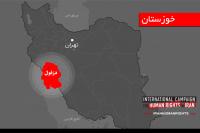
 ‘Arab Iranians part of Green Movement’ says Arab activist
‘Arab Iranians part of Green Movement’ says Arab activist
Ardeshir Amir-Arjomand, a top advisor to opposition leader Mir Hossein Mousavi, has condemned the violent clampdowns in Iran’s Arab-majority Khuzestan Province.
“The security, territorial integrity, independence and sustainable development of the country can only be realised with the participation of all Iranian citizens irrespective of their gender, language, ethnicity, religion or political leaning, and in accordance with accepted international human rights conventions,” said Amir-Arjomand, who is also the spokesperson for the Coordination Council of the Green Path of Hope, the opposition’s leading decision-making body.
“The use of unjustifiable violence in dealing with the legitimate demands of ethnic and religious minorities is in violation of national interests and the [Islamic] Revolution’s fundamental ideals,” he added. “The Coordination Council of the Green Path of Hope condemns the repression, arrest and the illegitimate use of violence against Khuzestani citizens who pursue their demands through peaceful means.” The statement then called on the authorities to release all political prisoners regardless of their ethnicity or religion.
According to Human Rights Watch, more than 65 Iranian Arab residents of Khuzestan Province have been detained during security sweeps since late 2011. “The Iranian government should immediately charge or release those arrested,” the organisation said in a recent statement.
It went on to add, “Authorities should also investigate reports by local activists that two detainees have died in Intelligence Ministry detention facilities.”
According to various reports, at least two Iranian Arabs have died in Ministry of Intelligence detention facilities in the south-western cities of Ahvaz and Shush, apparently as a result of torture.
Many of the detainees had reportedly made use of graffiti on public property to promote the boycott of the upcoming parliamentary elections on 2 March.
“Authorities should immediately divulge the reasons for the arrests, give detainees access to family members and lawyers, bring all detainees promptly before a judge, and hold anyone responsible for torture to account,” said Joe Stork, deputy Middle East director at Human Rights Watch.
Rights groups have repeatedly documented the discriminations against ethnic Arabs and the lack of socioeconomic development in the region.
Sources told the Green Voice of Freedom that Ali Hamidi, aged 20, died after being pursued by security forces in the city of Mollasani in Khuzestan province.
Security forces chased Hamidi and his friend, also on the bike, after they failed to stop at a checkpoint. The pursuit ended with the death of Hamidi, while severely wounding his friend. The two had been distributing flyers supporting the boycott of the March elections.
The overwhelming majority of Iranian opposition parties and dissident groups, among them the Coordination council, have boycotted the upcoming vote on 2 March.
In an interview with the Green Voice of Freedom, Yusef Azizi Bani-Torof, an Iranian journalist and activist of Arab origin, said that Iranian Arabs were “very seriously” in favour of boycotting the upcoming elections.
“In the May 1997 [presidential] elections, after provinces such as Yazd [Khatami’s home province] most of Khatami’s votes came from Khuzestan,” he said. “After 23 May [1997], even though some of the demands of the Arab people did not materialise, it paved the way for an environment for cultural and political activity [amongst the Arab community] and they even formed the Wifagh party.”
Bani-Torof argued that despite their many different political leanings, most Iranian Arabs “see themselves as being closer to the Green Movement.” “Some [Iranian Arabs] see themselves as being part of the pro-democracy movement in Iran, but have a kind of distance from the Green Movement, but at the same time they support political prisoners and the victims of the post-election unrest [in 2009].”
He said that opposition supporters within the Arab community were mobilising ahead of Green Movement protests on Tuesday. “A group of Arab activists called ‘Activists from Arab Civil Society’ have [also] backed the Green Movement’s calls for [demonstrations] on 14 February.”
The human rights activist explained that Iranian Arabs are at times arrested not because of their ethnicity, but rather for belonging to the Sunni sect of Islam.
Shiite Islam is the dominant faith amongst Iran’s Arab community.
 In late January, the Coordination Council of the Green Path of Hope issued a statement calling on Iranians to take to the streets on the one year anniversary of the last major opposition demonstrations in the country. The council said:
In late January, the Coordination Council of the Green Path of Hope issued a statement calling on Iranians to take to the streets on the one year anniversary of the last major opposition demonstrations in the country. The council said:
“Despite the fact that Iran’s oil revenues in recent years have surpassed $600 billion (more than the revenues of all post-revolution governments put together), the conduct of those who rose to power with promises of justice and bringing oil income to the people’s tables, stamping out poverty, corruption and discrimination, has led to nothing but the decline of economic growth and investment to its lowest levels and the rise of inflation and unemployment to its highest in the past twenty years, while the scope of poverty, corruption and discrimination has widened at a disastrous rate.”
Amnesty International called on Iranian authorities to “respect freedom of assembly and allow [the] peaceful demonstrations” planned for Tuesday.
Mir Hossein Mousavi and Mahdi Karroubi spearheaded the Green Movement until mid-February 2011 when they were placed under house arrest after they had called for protests in solidarity with the Arab Spring on 14 February. The demonstrations were marred by the security forces’ violent crackdowns which left at least two dead.
Since the start of their arbitrary detention, the 2009 presidential candidates have not yet been granted a fair trial. Rights groups say their continued captivity and maltreatment is inconsistent not only with human rights provisions but also with Iran’s own constitution.
Click HERE to read more.

Be the first to comment